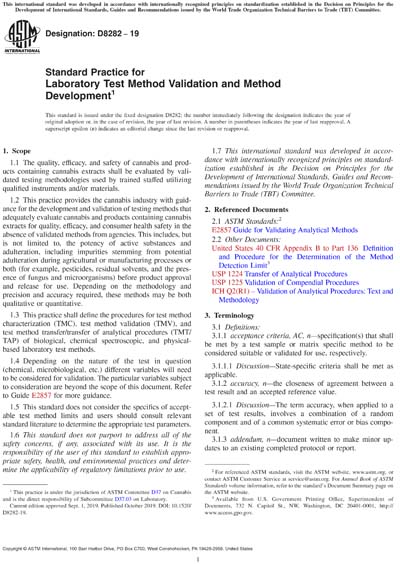Most recent
ASTM D8282-19
Standard Practice for Laboratory Test Method Validation and Method Development
1.1 The quality, efficacy, and safety of cannabis and products containing cannabis extracts shall be evaluated by validated testing methodologies used by trained staffed utilizing qualified instruments and/or materials.
1.2 This practice provides the cannabis industry with guidance for the development and validation of testing methods that adequately evaluate cannabis and products containing cannabis extracts for quality, efficacy, and consumer health safety in the absence of validated methods from agencies. This includes, but is not limited to, the potency of active substances and adulteration, including impurities stemming from potential adulteration during agricultural or manufacturing processes or both (for example, pesticides, residual solvents, and the presence of fungus and microorganisms) before product approval and release for use. Depending on the methodology and precision and accuracy required, these methods may be both qualitative or quantitative.
1.3 This practice shall define the procedures for test method characterization (TMC), test method validation (TMV), and test method transfer/transfer of analytical procedures (TMT/TAP) of biological, chemical spectroscopic, and physical-based laboratory test methods.
1.4 Depending on the nature of the test in question (chemical, microbiological, etc.) different variables will need to be considered for validation. The particular variables subject to consideration are beyond the scope of this document. Refer to Guide E2857 for more guidance.
1.5 This standard does not consider the specifics of acceptable test method limits and users should consult relevant standard literature to determine the appropriate test parameters.
1.6 This standard does not purport to address all of the safety concerns, if any, associated with its use. It is the responsibility of the user of this standard to establish appropriate safety, health, and environmental practices and determine the applicability of regulatory limitations prior to use.
1.7 This international standard was developed in accordance with internationally recognized principles on standardization established in the Decision on Principles for the Development of International Standards, Guides and Recommendations issued by the World Trade Organization Technical Barriers to Trade (TBT) Committee.
Content Provider
ASTM International [astm]






